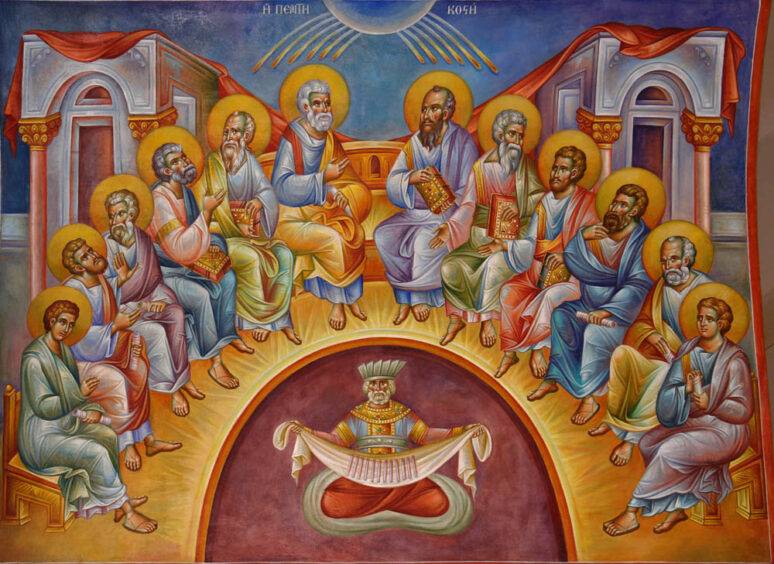
Calendar for June 23 -Descent of the Holy Spirit on the Apostles - Spirits - Trinity
After Christ's ascension, the disciples remained in Jerusalem and in one room in Zion they often gathered and prayed together to God, eagerly awaiting the promised Comforter, the Holy Spirit, who proceeds from the Father. The place of Judas Iscariot among the twelve was filled by Matthias. On Pentecost, everyone was together, when a roar filled the whole house and tongues of fire appeared and descended on each of the apostles. Having gone out on the roof of the house, they spoke and preached to the gathered people in languages they did not know until then, so that all gathered, both Jews and non-believers, understood them. Three thousand people on this day believed the apostle's preaching and were baptized. This day is considered the birth day of the Church of Christ.
As on the feast of Pentecost, the Jews, that means the apostles on that Pentecost, decorated their houses with branches, flowers and grass, remembering the time when, after slavery, they wandered with Moses in the desert and lived in huts made of branches and leaves, even today on the feast of Descent They fill the Holy Spirit on the apostles of the Orthodox Church with grass and flowers from which wreaths are woven.
SPIRITS, the Trinity, Descent of the Holy Spirit on the Apostles, a holiday representing the birthday of the Christian Church; and it is celebrated on the 50th day after the Christian Passover (Easter), so it is also called Pentecost. This Christian holiday corresponds to the Jewish holiday of Pentecost, which was celebrated as the Feast of Weeks (Sunday) or the Feast of Harvest (Exodus 34:32), also on the 50th day after Passover. In the Christian Church, on Pentecost, the commemoration of the Descent of the Holy Spirit on the Apostles is celebrated.
On the fiftieth day after the Resurrection and the tenth day after the Ascension, the abundant grace of the Holy Spirit was poured out on the disciples of Christ, and filled them with the strength to establish Christ's law on earth: "And when the fifty days were over, all the apostles were together with one accord. And suddenly there arose a noise from the sky like the howling of a mighty wind, and it filled the whole house where they were sitting; And there appeared to them divided tongues as of fire, and one came down on each of them. And they were all filled with the Holy Spirit and began to speak in other languages, as the Spirit gave them the ability to speak." (Dap 2,1-4) This is how what Jesus Christ promised to his disciples before going to Heaven was fulfilled. The power of the Holy Spirit immediately began to work because St. After that, Peter won three thousand people to the doctrine of Christ with his fiery words.
PENTECOSTAL - In Judaism, the fiftieth day after Passover, or the Feast of Weeks (Exodus 34:22), or the Harvest Festival (Exodus 23:16), or the Day of First Fruits (Numbers 28, 26). According to the rabbinical interpretation of late Judaism, on Pentecost the commemoration of the receiving of the Sinai legislation was also celebrated, for which there is no biblical basis. From the 16th of Nisan (March-April), seven weeks were calculated, and the next or 50th day was the day of Pentecost, which fell on the 6th of Sivan - sometime at the end of May (Exodus 23:16; 34:22; Leviticus 23, 15-22, 4 Moi 28). During this Jewish holiday in the Jerusalem Temple, in addition to prayers and sacrifices, certain sections from the Law of Moses and from other sacred books (later also from the Talmud) were read. As on Passover and the Feast of Tabernacles, and on Pentecost all adult male Jews were required to visit the Temple in Jerusalem.
Pentecost was the Jewish day of prayer and the people were especially instructed to rejoice before the Lord, with their household, their servants, the Levite in his place, and the stranger (sojourner), orphan or widow "in the place chosen by the Lord your God to dwell there your name." (Deuteronomy 16:9-12). A special feature of the celebration was the offering of two leavened breads baked from new wheat flour (the first of the harvest). With them two lambs were offered as a sacrifice of atonement, and all this was lifted up before the Lord and given to the priests; since the loaves were leavened, they could not be offered on the altar. Other sacrifices were like a burnt offering: a calf, two rams and seven lambs "with their gifts and their offerings (drink offerings)" and a goat as a sin offering (3 Mo 23,17-19).
Until the Pentecost breads were offered, the fruits of the harvest were not to be eaten, nor could other first fruits be offered. The whole ceremony culminated in the consecration of the harvest to God as the giver, to whom both the land and the people were sacred, and which began with the offering of a sheaf of wheat on Passover. The interval between these two holidays was considered a religious season. The celebration of Pentecost itself is mentioned in the Bible only in one place (2 Dn 8,13). Pentecost is the only one of the three great feasts that is not mentioned as a commemoration of events in Jewish history; but such significance is found in the fact that the law was given at Sinai on the 50th day after the deliverance from Egypt (cf. Exodus 12 and 19). During the exodus, the people were offered to God as living firstfruits (first fruits); at Sinai their consecration to Him as a people was completed.
The prefigurative meaning of Pentecost is evident in the events of the day of Pentecost recorded in the Acts of the Apostles (Acts 2). Just as the appearance of God on Sinai was the birthday of the Jewish people, so the New Testament Pentecost (or Spirits) was the birthday of the Christian Church.
It is one of the most magnificent Christian holidays from the apostolic era (Acts 2:1-22). Divine services on Pentecost are characterized by an evening service, which is performed at the end of the Liturgy, as a memorial to the fact that the Apostles immediately dispersed throughout the world to preach; the prayers of St. are read on it. Basil the Great; in them, the Church prays for the gift of the Spirit of grace, for the healing of physical and mental ailments, and for him to make us all worthy of the heavenly Kingdom. On this holiday, also theologically called the Trinity, because the Holy Spirit - the Holy Spirit - appeared physically, the Orthodox Church decorates temples, in which green grass is brought, and in the time of the old Church, greenery was also brought into houses (St. Gregory the Theologian, Sermon 44).
This custom was transferred to the Christian Church from the Judean Church, where in honor of receiving the Sinai legislation, which was given under a clear sky, the synagogue and houses were decorated with twigs; this symbolism is an expression of gratitude to God. The worship service of the New Testament Church perfectly reflects the connection of these two namesake holidays in Old and New Israel, with the fact that the event in Jerusalem is at the center of the Christian liturgical poetic opus, and the Old Testament holiday is an excellent background - a primeval image.
Just as the appearance of God on Sinai was the birthday of the Jewish people, so the Descent of the Holy Spirit on the Apostles is the birthday of the Christian Church - on the same day, after the sermon of St. Peter, three thousand believers were converted (DAp 2,4). The event of Pentecost is closely related to the experience of glossolalia, speaking in unknown languages, or understanding foreign languages.
In Church iconography, the Descent of the Holy Spirit is represented by a faithful image of the Apostles sitting on the side, with an empty place at the head (that place is for the Lord Christ, who ascended to heaven ten days earlier).
On one occasion, during the Jewish holiday of Pentecost, Jesus Christ watched the pouring of wine and water, which the Jews took from the well of Siloam, and exclaimed: "Whoever is thirsty, let him come to me to drink!", by which he meant to say: The waters of Siloam will disappear. ; the altar will perish and the temple will disappear, but the human soul will always be thirsty for the water of salvation, and only I can give you that water, because I am the inexhaustible and eternal source of life! This holiday was established by the Apostles, and it always falls on a Sunday. Since God the Son promised to send the Holy Spirit, and God the Father allowed it, all the Three Persons of God participate in that event.
On that day, churches are decorated with green twigs and sprinkled with grass. The event of this day is represented on the icon: a gathering of Apostles, and among them the Holy Virgin Mary the Mother of God, and above the heads of each one a flame like a tongue of fire. However, it can also be presented in the form of three travelers, when God appeared to the forefather Abraham near the Mamvrija oak (Genesis 18:1-2).
This holiday is also connected to ancient times, when the festival of harvest, joy and love was celebrated. Ten girls dressed up and adorned themselves beautifully, and went from house to house, and among them was one king, one queen, one standard-bearer, and the rest were court ladies. Holding yataganas wrapped in towels, they dance and sing songs about marriage, marriage, proposal, happy meeting, joy around children.
The three are celebrated as a big holiday in Šumadija. On that day, cross-bearers went to many villages.
Holy priest-martyr Timothy Bruski, Holy martyrs Alexander and Antonina. Saint Basilian, bishop of Lavdia.
PHOTOS
RELATED ARTICLES
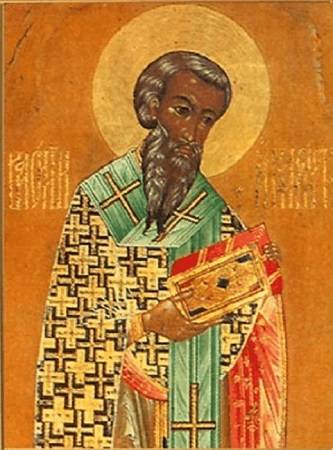
Calendar for May 9 His Homilist Basil of Amasia
Licinius, the son-in-law of Emperor Constantine, whose sister he had married,...
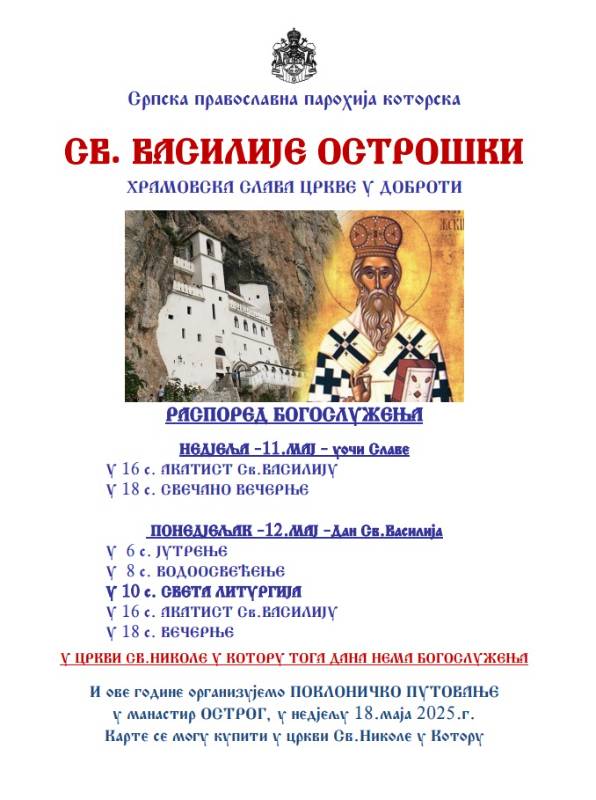
WORSHIPS ON THE OCCASION OF ST. VASILIJE OSTROŠKI
SERBIAN ORTHODOX PARISH OF KOTOR ANNOUNCES WORSHIPS ON THE OCCASION OF ST....
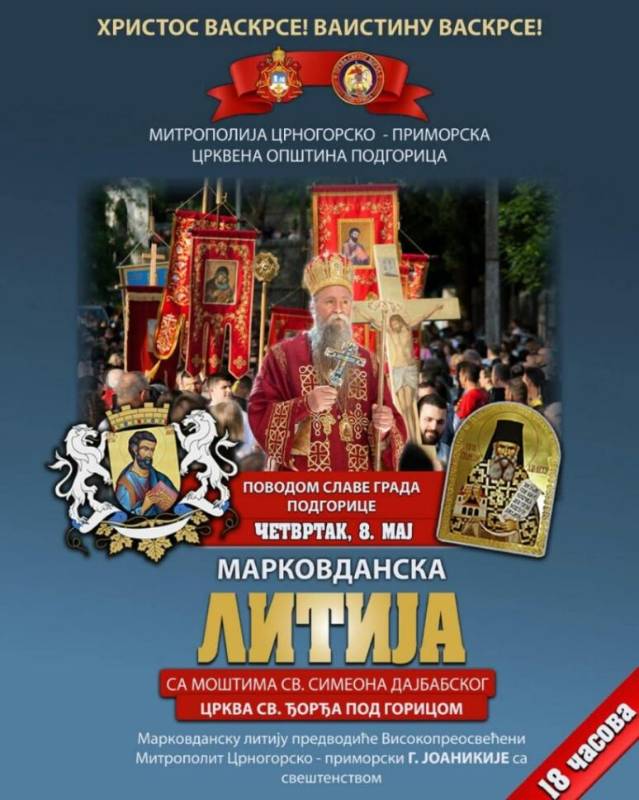
St. Mark's Day procession in Podgorica
On the occasion of the celebration of the city of Podgorica, the...


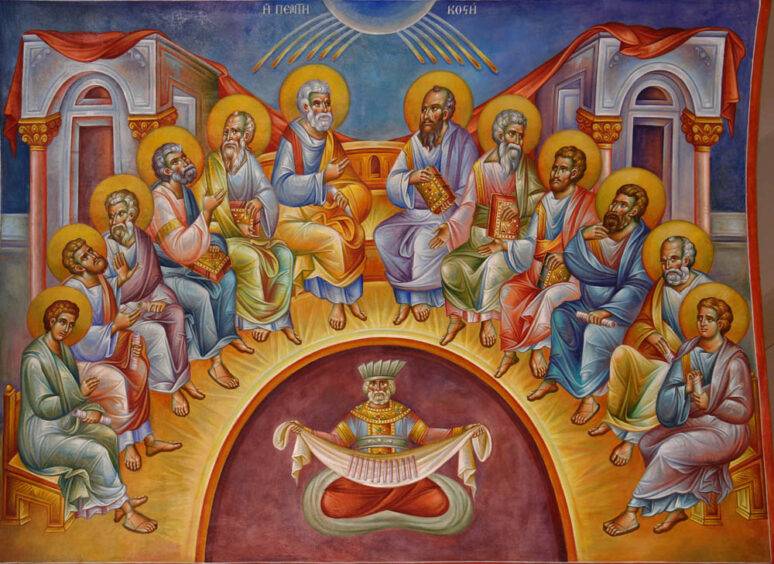

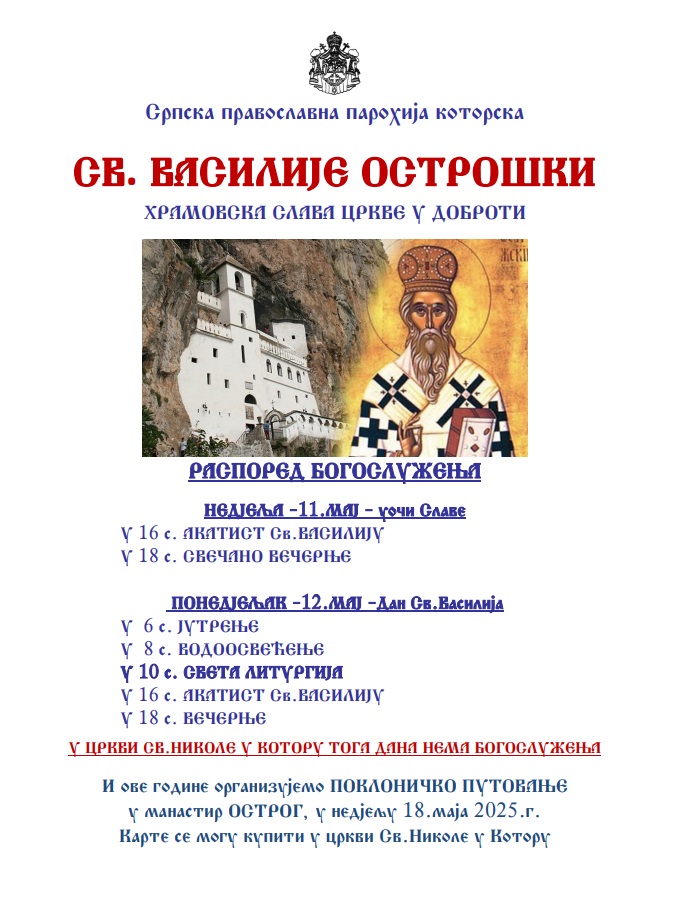
.png)